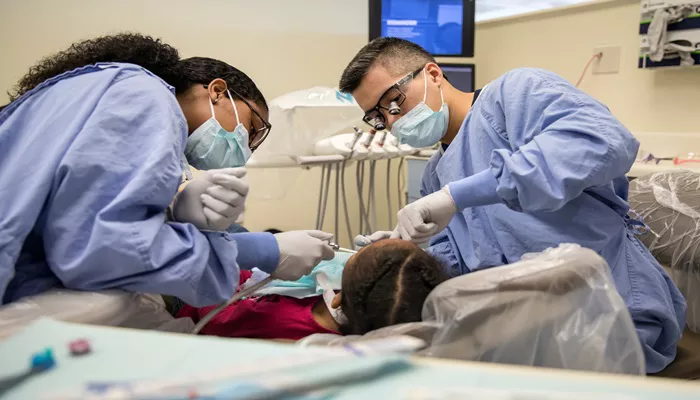Dental implants are a popular solution for replacing missing teeth. They provide a long-lasting and stable option that can significantly improve a person’s quality of life. However, the cost of dental implants can be high, often making them inaccessible for many. One alternative that has gained attention is obtaining dental implants at dental schools. This article explores the costs associated with dental implants at dental schools, the process involved, and the benefits of choosing this option.
Understanding Dental Implants
Dental implants consist of titanium posts that are surgically placed into the jawbone. These posts act as artificial roots for replacement teeth, which are attached after the implants have integrated with the bone. The process of getting dental implants typically involves several steps, including initial consultations, surgical placement of the implants, and follow-up visits for adjustments and final restorations.
Why Choose A Dental School?
Dental schools offer a unique opportunity for patients to receive dental care at reduced costs. Students in dental programs perform procedures under the supervision of experienced faculty members. This setup allows patients to benefit from high-quality care while also helping students gain valuable hands-on experience.
Cost of Dental Implants at Dental Schools
The cost of dental implants at dental schools varies based on several factors, including the complexity of the case and the specific school. Here’s a breakdown of typical costs based on various dental schools:
University of Iowa College of Dentistry:
Dental Student: $2,000 – $5,000
Residents: $3,500 – $5,000
Faculty: $4,600 – $6,000
University of Pittsburgh School of Dental Medicine:
Approximately $900 for the implant itself, not including restoration costs.
Boston University Henry M. Goldman School of Dental Medicine:
Costs around $1,200 for a single dental implant.
University of Maryland School of Dentistry:
Total cost for an implant can be around $1,416, depending on the specifics of the case.
These costs are generally lower than what you would find at private dental practices, where the price for a single implant can range from $3,000 to $5,000 or more.
SEE ALSO: The 5 Main Reasons for Dental Implant Failure
Factors Influencing The Cost
Several factors can influence the overall cost of dental implants at dental schools:
Type of Provider: The level of the provider (student, resident, or faculty) can affect the price. Students typically charge less than residents and faculty.
Complexity of the Case: More complex cases, such as those requiring bone grafting or multiple implants, will incur higher costs.
Location: Costs can vary by geographic location, with urban schools often having different pricing structures compared to rural institutions.
Insurance Coverage: Some dental insurance plans may cover a portion of the costs associated with dental implants, but many do not. It is essential to check with your insurance provider to understand your coverage.
The Dental Implant Process at Schools
Getting dental implants at a dental school involves several steps. Here’s a general overview of the process:
Initial Consultation: This appointment includes a comprehensive examination, X-rays, and a discussion of your medical history. The dental team will determine if you are a suitable candidate for implants.
Treatment Planning: After the initial assessment, a treatment plan will be developed. This plan outlines the steps involved, expected timelines, and costs.
Surgical Placement: The implant surgery is performed by dental students under the supervision of faculty. This step involves placing the titanium posts into the jawbone.
Healing Period: After the implants are placed, a healing period is necessary for the implants to integrate with the bone. This period can last several months.
Abutment Placement: Once the implants have healed, an abutment (a connector piece) is placed on top of the implant.
Final Restoration: After the abutment is placed, impressions are taken to create the final crown, bridge, or denture that will be attached to the implants.
Time Commitment
The entire process of getting dental implants at a dental school can take longer than at a private practice. For example:
Dental Students: The process may take about 1 year, requiring 6 to 10 visits, each lasting approximately 4 hours.
Residents: The timeline is similar, with 6 to 10 visits needed, each lasting 1 to 3 hours.
Faculty: The process can be completed in about 6 to 8 months, requiring 6 to 8 visits, each lasting 1 to 3 hours.
Benefits of Choosing Dental Schools
Choosing to get dental implants at a dental school offers several advantages:
Cost Savings: As previously mentioned, the costs at dental schools are generally lower than at private practices.
High-Quality Care: Dental students are closely supervised by experienced faculty, ensuring that patients receive high-quality care.
Comprehensive Treatment: Dental schools often provide a wide range of services, allowing for comprehensive treatment plans that address multiple dental needs.
Educational Experience: Patients can feel good about contributing to the education of future dentists while receiving their treatment.
Considerations Before Choosing A Dental School
While there are many benefits to getting dental implants at a dental school, there are also some considerations to keep in mind:
Longer Treatment Times: The treatment process may take longer due to the involvement of students and the need for thorough supervision.
Availability of Appointments: Dental schools may have limited availability for appointments, which could impact scheduling.
Complex Cases: Some complex cases may not be suitable for treatment at a dental school, so it is essential to discuss your specific situation during the initial consultation.
Conclusion
Dental implants can be a significant investment in your oral health and overall quality of life. While the costs can be high, dental schools offer a more affordable alternative for those seeking this treatment. With the potential for significant savings and the assurance of high-quality care under supervision, dental schools can be an excellent option for individuals considering dental implants.

